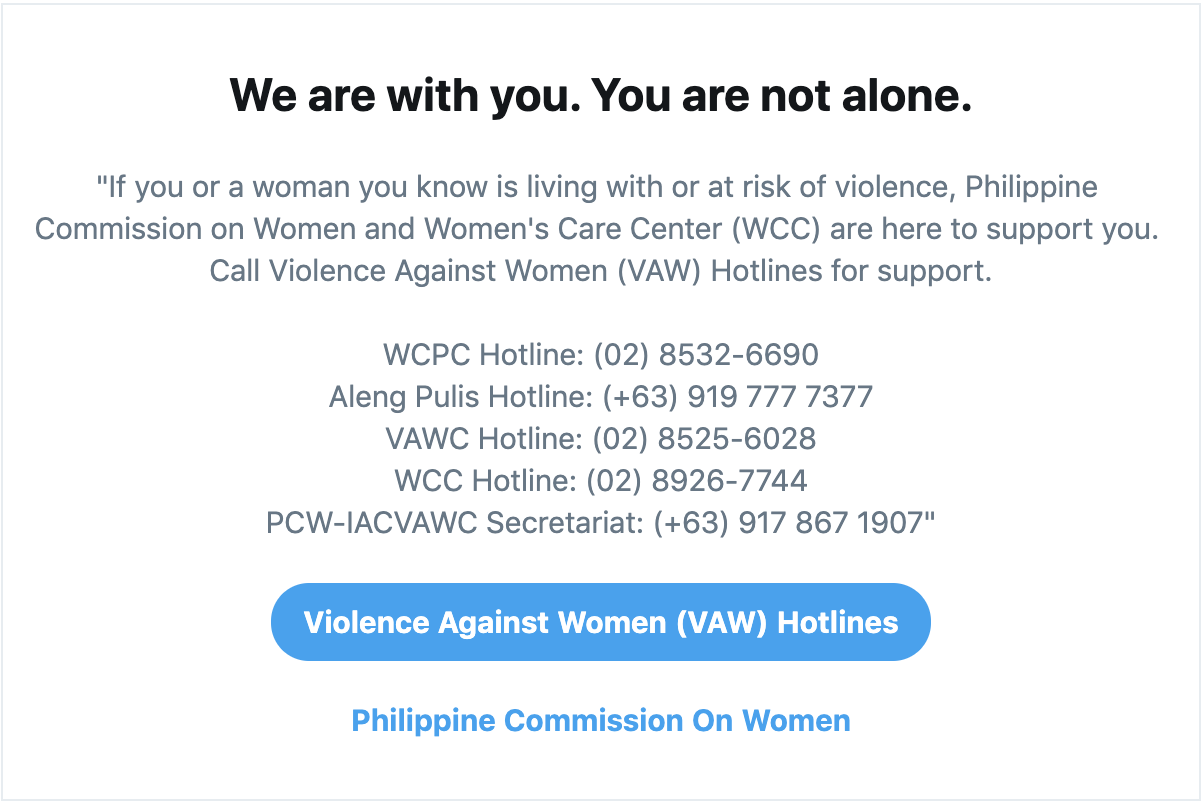Microblogging platform Twitter recently launched an initiative to help online users prevent gender-based violence at a time when people are homebound due to government-imposed lockdowns to curb the spread of COVID-19.
The initiative is a search prompt notification that helps users alert local organizations that can provide support in cases of sexual and physical violence against women and children.
The platform says that whenever Twitter users search Filipino keywords associated with gender-based violence, a notification written in Filipino would appear on top of their timeline which contains hotlines of organizations that can be contacted for support.

Hotlines of the Philippine Commission on Women (PCW) and the Women’s Care Center (WCC) can be seen on top of the user’s feed.
PCW is the primary policy-making and coordinating government agency on women and gender equality concerns in the country.
WCC, meanwhile, is a non-profit organization that provides a supportive environment where women who have survived violence can interact with other survivors through group counseling, education programs, recreation activities, or skills training.
We are pleased to partner with @TwitterPH @Policy @NonProfits on #ThereIsHelp in the Philippines. This appears when certain keywords relating to gender-based violence are searched! Through this, women will be encouraged to seek help. We are here for you! pic.twitter.com/A17r871dDq
— Philippine Commission On Women (@PCWgovph) May 29, 2020
“During this pandemic, we continue to promote the protection of women from violence. We are utilizing all the tools and platforms, including digital channels and social media platforms, to make sure all women know that we are here to help,” lawyer Kristine Yuzon-Chaves, the executive director of PCW, said in a release.
“Through this search prompt, we hope survivors, or their family and friends will be emboldened to speak up, seek safety, stand up against violence, and hold the perpetrators accountable,” she added.
Twitter partnered with UN Women Asia Pacific to launch the initiative in seven countries, namely Indonesia, Malaysia, Thailand, Singapore, South Korea, Vietnam and the Philippines.
‘#ShadowPandemic’ on the rise
UN Secretary General António Guterres previously called for measures to address the “horrifying surge in domestic violence” that was linked to government-imposed lockdowns in which the public was urged to remain at home.
Peace is not just the absence of war. Many women under lockdown for #COVID19 face violence where they should be safest: in their own homes.
Today I appeal for peace in homes around the world.
I urge all governments to put women’s safety first as they respond to the pandemic. pic.twitter.com/PjDUTrMb9v
— António Guterres (@antonioguterres) April 6, 2020
“The combination of economic and social stresses brought on by the pandemic, as well as restrictions on movement, have dramatically increased the numbers of women and girls facing abuse, in almost all countries,” United Nations reported.
Latest report of UN Women revealed that around 243 million women and girls aged 15-49 globally have been subjected to sexual and/or physical violence perpetrated by an intimate partner in the past 12 months.
“Emerging data shows that since the outbreak of COVID-19, violence against women and girls, and particularly gender-based violence, has intensified across the globe,” Twitter noted.
Melissa Alvarado, UN Women Asia Pacific Regional Manager on Ending Violence against Women, believes that violence against women and girls continue to be “widely under reported.”
“Globally, one in three women experience violence at least once in their lifetime. In fact, in many countries in our region, the number is even greater, with as many as 2 out of 3 women in some countries reporting experiences of violence,” she said.
“Less than four in 10 women experiencing such violence actually report these crimes or seek help of any sort. As lockdowns and stay-at-home orders are getting prolonged by countries around the world to contain the spread of COVID-19, women with violent partners increasingly find themselves isolated from the people and resources that can help them,” Alvarado added.
RELATED: Online child sex abuse cases triple under lockdown in Philippines










